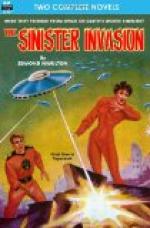The actual news was specific. Small towns around the fringe of the Park area were being evacuated of all their inhabitants. Foreign scientists had been flown to the United States and were at the temporary area command post not far from Boulder Lake. Rocket missiles were aimed and ready to blast the lake and the mountains around it should the need arise. A drone plane had been flown to the lake with a television camera transmitting back everything its lens saw. It arrived at the lake and its camera relayed back exactly nothing that had not been photographed and recorded before. But suddenly there was a crash of static and the drone went out of control and crashed. Its camera faithfully transmitted the landscape spinning around until its destruction. Military transmitters were beaming signals on every conceivable frequency to what was now universally called the alien spaceship. They had received no replies. The foreign scientists had agreed that the terror beam—paralysis beam—death beam—was electronic in nature.
Lockley had thought Jill asleep from pure weariness, but her voice came out of the darkness beside the big tree trunk.
“You found that out!” she said. “About its being electronic!”
“I had a sample stationary beam to check on,” said Lockley. “They haven’t. Which may be a bad thing. Nobody’s going to make useful observations of something that makes him blind and deaf and paralyzed while he’s in the act. There are some things that puzzle me about that. Why haven’t they killed anybody yet? They’ve got the public about as scared as it can get without some killing. And why didn’t we get the full force of the beam after the plane had been driven away? They could have given us the full treatment if they’d wanted to. Why didn’t they?”
“If people run away from the towns,” said Jill’s voice, very tired and sleepy, “maybe they think that’s enough. They can take the towns....”
Lockley did not answer, and Jill said no more. Her breathing became deep and regular. She was so weary that even hunger could not keep her awake.
Lockley tried to think. There was the matter of food. Bracken shoots were common enough but unsubstantial. It would need more careful observation to note all the likely spots for mushrooms. Perhaps they were far enough from the lake to take more time hunting food. They were almost exactly in the situation of Australian bushmen who live exclusively by foraging, with some not-too-efficient hunting. But Australian savages were not as finicky as Jill and himself. They ate grubs and insects. For this sort of situation, prejudices were a handicap.




